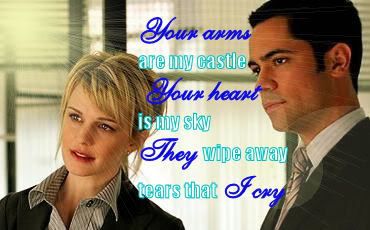Post by Naj on Dec 30, 2005 19:42:21 GMT -5
*Cold Case mention/comparison
Serving the innocent when justice is blind
Friday, December 30, 2005
In Justice
(Previews Sunday at 10 p.m., then airs Fridays at 9 p.m. on Channel 7) A team of lawyers and investigators try to get wrongly convicted people out of prison. Kyle MacLachlan and Jason O'Mara star.
WITH "LOST," "Desperate Housewives" and "Grey's Anatomy," ABC was the network that rescued the primetime drama from the clutches of Jerry Bruckheimer, Dick Wolf and their army of interchangeable self-contained procedural crime shows. So why exactly would ABC pick up a show like "In Justice," with its cadre of lawyers, detectives and cases solved in an hour or your pizza's free?
Maybe they bought it because "In Justice" isn't quite what it appears. Sure, there are DNA tests, ballistic reports, grainy flashbacks and all the other genre staples. But the show is really "Cold Case" with the politics reversed.
Loosely inspired by the work of the Innocence Project, a pro bono organization that uses DNA evidence to free the wrongly convicted, "In Justice" stars Kyle MacLachlan and Jason O'Mara as a lawyer and ex-cop, respectively, who decided in midcareer that they were working for the wrong side. So now MacLachlan's playboy David Swain brings publicity and legal expertise to the National Justice Project, while O'Mara's Charles Conti does the legwork.
Where the Bruckheimer shows preach the infallibility of technology and law-enforcement, "In Justice" shows the many cracks in the system. A witness mistakes a perp's race due to bad lighting. A defense lawyer never bothers to get a crucial ballistics test done because he doesn't think he needs it. An evidence technician doesn't notice that a damning fingerprint on a gun is in the wrong position for the accused to have fired it.
A typical "Cold Case" closes with Kathryn Morris nodding solemnly as justice long-delayed finally occurs; with "In Justice," you see O'Mara choking back tears as one of his clients finally breathes free air after too many years stolen.
As a counterpoint to the CBS and NBC shows, "In Justice" is an interesting curiosity, but it's not that good. Repetitive as "Cold Case" or "Without a Trace" may be, they show a level of craft and entertainment that "In Justice" lacks.
MacLachlan, who specializes in tightly-wound kooks like "Twin Peaks" pie-lover Dale Cooper or "Sex and the City" mother-lover Trey, is miscast as Swain, a devil-may-care charmer who conveniently has a city full of ex-girlfriends with expertise that becomes useful for his cases (a sound engineer, a doctor, etc.). O'Mara, somehow seeming smaller than he did as a special forces he-man on CBS' "The Agency," comes off better as Conti, but he's mostly there to explain the plot.
The real Innocence Project has a strict policy of only taking cases involving DNA evidence. A series where every episode climaxed with samples being retested wouldn't be that exciting, but the Justice Project's method of choosing among the hundreds of submitted appeals seems completely arbitrary.
More calculated is ABC's choice for how to schedule these cases. The pilot episode features a black man framed for a jewelry store robbery-homicide by an evil FBI agent (a clunky twist that's less scary than the ones where people go to jail through simple human error), but ABC isn't showing it first. Instead, the series will debut with its third episode, where the client is a recovered suburban junkie played by "Two and a Half Men" co-star Marin Hinkle.
Why the switcheroo? I don't have a concrete answer, but I can make some guesses based on the evidence. First, ABC is previewing the series after a "Desperate Housewives" clip show, and Hinkle looks a lot more like someone who might live on Wisteria Lane.
Second, the clients of the real version of the Justice Project are predominantly black and Latino. As enlightened as TV audiences have become, ABC may have felt gunshy about leading off with the story of a black man wrongfully sent to prison for a white man's crime.
The Bruckheimer shows do the same thing, sacrificing verisimilitude in favor of what they think is mass appeal. A real version of the "Without a Trace" squad would almost exclusively work missing children cases with bad endings, but that's probably not the kind of show that 20 million people would watch every week.
What's made the "CSI"s and their imitators so popular is the certainty they provide in these increasingly uncertain times. A show like "In Justice" that suggests cops aren't automatically right, that the evidence can sometimes lie, that innocent people can lose decades to those mistakes, isn't likely to lure the Bruckheimer audience. But it's also too structurally similar to those shows to appeal to people who are fed up with them.
Even a champion of lost causes like David Swain wouldn't take a case with odds this lousy.
{star ledger}
Serving the Innocent
Serving the innocent when justice is blind
Friday, December 30, 2005
In Justice
(Previews Sunday at 10 p.m., then airs Fridays at 9 p.m. on Channel 7) A team of lawyers and investigators try to get wrongly convicted people out of prison. Kyle MacLachlan and Jason O'Mara star.
WITH "LOST," "Desperate Housewives" and "Grey's Anatomy," ABC was the network that rescued the primetime drama from the clutches of Jerry Bruckheimer, Dick Wolf and their army of interchangeable self-contained procedural crime shows. So why exactly would ABC pick up a show like "In Justice," with its cadre of lawyers, detectives and cases solved in an hour or your pizza's free?
Maybe they bought it because "In Justice" isn't quite what it appears. Sure, there are DNA tests, ballistic reports, grainy flashbacks and all the other genre staples. But the show is really "Cold Case" with the politics reversed.
Loosely inspired by the work of the Innocence Project, a pro bono organization that uses DNA evidence to free the wrongly convicted, "In Justice" stars Kyle MacLachlan and Jason O'Mara as a lawyer and ex-cop, respectively, who decided in midcareer that they were working for the wrong side. So now MacLachlan's playboy David Swain brings publicity and legal expertise to the National Justice Project, while O'Mara's Charles Conti does the legwork.
Where the Bruckheimer shows preach the infallibility of technology and law-enforcement, "In Justice" shows the many cracks in the system. A witness mistakes a perp's race due to bad lighting. A defense lawyer never bothers to get a crucial ballistics test done because he doesn't think he needs it. An evidence technician doesn't notice that a damning fingerprint on a gun is in the wrong position for the accused to have fired it.
A typical "Cold Case" closes with Kathryn Morris nodding solemnly as justice long-delayed finally occurs; with "In Justice," you see O'Mara choking back tears as one of his clients finally breathes free air after too many years stolen.
As a counterpoint to the CBS and NBC shows, "In Justice" is an interesting curiosity, but it's not that good. Repetitive as "Cold Case" or "Without a Trace" may be, they show a level of craft and entertainment that "In Justice" lacks.
MacLachlan, who specializes in tightly-wound kooks like "Twin Peaks" pie-lover Dale Cooper or "Sex and the City" mother-lover Trey, is miscast as Swain, a devil-may-care charmer who conveniently has a city full of ex-girlfriends with expertise that becomes useful for his cases (a sound engineer, a doctor, etc.). O'Mara, somehow seeming smaller than he did as a special forces he-man on CBS' "The Agency," comes off better as Conti, but he's mostly there to explain the plot.
The real Innocence Project has a strict policy of only taking cases involving DNA evidence. A series where every episode climaxed with samples being retested wouldn't be that exciting, but the Justice Project's method of choosing among the hundreds of submitted appeals seems completely arbitrary.
More calculated is ABC's choice for how to schedule these cases. The pilot episode features a black man framed for a jewelry store robbery-homicide by an evil FBI agent (a clunky twist that's less scary than the ones where people go to jail through simple human error), but ABC isn't showing it first. Instead, the series will debut with its third episode, where the client is a recovered suburban junkie played by "Two and a Half Men" co-star Marin Hinkle.
Why the switcheroo? I don't have a concrete answer, but I can make some guesses based on the evidence. First, ABC is previewing the series after a "Desperate Housewives" clip show, and Hinkle looks a lot more like someone who might live on Wisteria Lane.
Second, the clients of the real version of the Justice Project are predominantly black and Latino. As enlightened as TV audiences have become, ABC may have felt gunshy about leading off with the story of a black man wrongfully sent to prison for a white man's crime.
The Bruckheimer shows do the same thing, sacrificing verisimilitude in favor of what they think is mass appeal. A real version of the "Without a Trace" squad would almost exclusively work missing children cases with bad endings, but that's probably not the kind of show that 20 million people would watch every week.
What's made the "CSI"s and their imitators so popular is the certainty they provide in these increasingly uncertain times. A show like "In Justice" that suggests cops aren't automatically right, that the evidence can sometimes lie, that innocent people can lose decades to those mistakes, isn't likely to lure the Bruckheimer audience. But it's also too structurally similar to those shows to appeal to people who are fed up with them.
Even a champion of lost causes like David Swain wouldn't take a case with odds this lousy.
{star ledger}
Serving the Innocent








 ..........
.......... ..........
.......... ...........
...........





